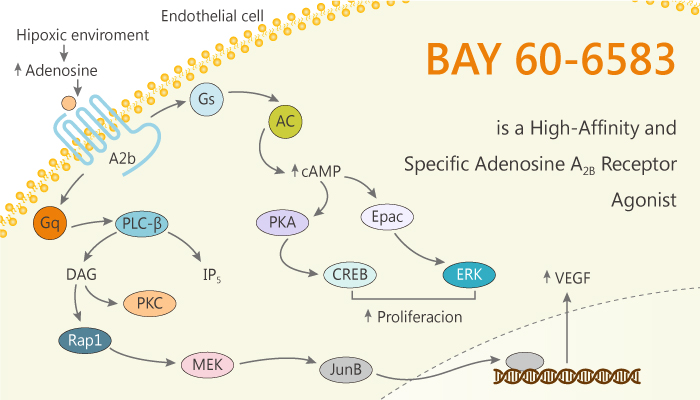In this article, we will introduce a potent and high-affinity agonist of adenosine A2B receptor, BAY 60-6583. BAY 60-6583 exhibits high affinity by binds to mouse, rabbit, and dog A2BAR with Ki values of 750nM, 340 nM and 330 nM, respectively.

We will describe this compound in vitro and in vivo.
Firstly, in vitro, in CHO cells expressing recombinant human A1, A2A or A2B ARs, BAY 60-6583 exhibits EC50 values for receptor activation >10 μM for both A1 and A2A AR and 3 nM for A2B AR subtype.
In T24 cells, at a concentration of 0-10 µM, BAY 60-6583 exhibits the maximum agonist effect of BAY in the absence of siRNA is 68 %. Meanwhile, BAY 60-6583 exhibits EC50 values of BAY in the absence and presence of siRNA with 98, 102, 127 and 93 nM, respectively.
Secondly, in RAW264.7 preosteoclasts, BAY 60-6583 can induce cell-cycle arrest. Additionally, it increases the accumulation of cells at the G1 phase with a decrease in G2/M phase. Additionally, BAY 60-6583 specifically inhibits the activation of Akt by M-CSF, whereas M-CSF-induced ERK1/2 activation is not affected by BAY 60-6583 treatment.
Lastly, in vivo studies will be precisely introduced here.
BAY 60-6583 (100 mcg/kg) can reduce the infarction area just before reperfusion in ischaemic rabbit hearts by intravenous injection.
pre-treatment with BAY 60-6583 can significantly decrease LPS-increased IL-6 levels and attenuate LPS-induced lung injury in WT mice. In contrast, in A2BAR−/− mice, BAY 60-6583 treatment is ineffective in abrogating these inflammatory parameters.
In female C57Bl6j and Athymic Nude-Foxn1nu mice, BAY 60-6583 promotes melanoma growth by inducing an immune-suppressive environment in the tumor tissue. This compound causes a significant increase in tumor-infiltrating MDSCs. However, it does not affect either their ability to suppress T-cell proliferation nor their degree of maturation. At the same time, it stimulates the production of IL-10 and CCL2 in the tumor tissue.
In summary, BAY 60-6583 is a potent and highly selective A2BAR agonist. It exhibits a high affinity to A2BAR in vitro and in vivo. BAY 60-6583 has a cardioprotective effect in a myocardial ischemia model. However, it promotes melanoma growth by inducing an immune-suppressive environment in mice.
Reference:
Aherne CM, et al.Mucosal Immunol. 2015 Nov;8(6):1324-38.
Yoon Taek Oh, et al. Biomed Sci Letters 2017;23:194-200